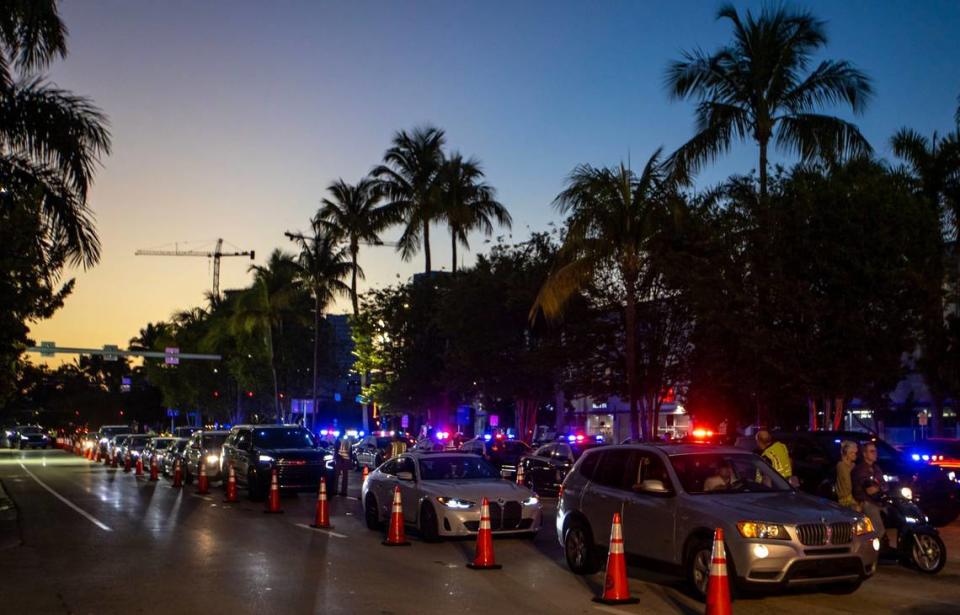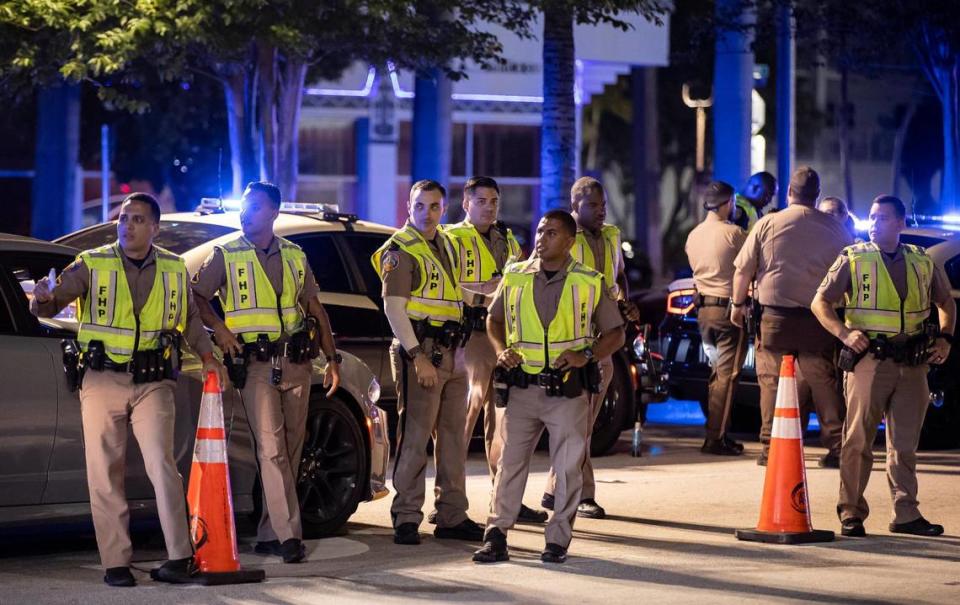Miami Beach commission votes preemptively for spring break curfews, beach restrictions
The Miami Beach City Commission voted Wednesday to call for midnight curfews and the 6 p.m. closure of the beach in South Beach during two weekends in March in anticipation of a flood of spring break visitors.
City officials outlined a slew of measures aimed at shutting down the party atmosphere that in recent years has seen large crowds pack Ocean Drive and led to shootings that have made international headlines.
Wednesday’s vote represents a preemptive plan to implement curfews and close beaches ahead of the arrival of spring break crowds. In past years, the city has only implemented curfews and declared a state of emergency in response to violent incidents, in part because of legal concerns about the ability to do so ahead of time.
“If somebody thinks we’re doing too much, that means we’re probably doing it right,” Mayor Steven Meiner said during Wednesday’s meeting. “We mean business.”
Last March, the city imposed a midnight curfew after stampedes and a pair of deadly shootings on Ocean Drive, including a gruesome incident on a crowded sidewalk that was captured in a viral video.
After those incidents, City Attorney Rafael Paz said that, given the pattern of violence and unruly crowds over several years, the city has a strong legal case to preemptively announce its intention to impose curfews and other safety measures during spring break.
City Manager Alina Hudak will still need to formally declare a state of emergency before those measures can go into effect.

The measures approved Wednesday apply to two weekends — March 8 to 10 and March 15 to 17 — when the city is expecting the largest numbers of visitors. The 6 p.m. beach closures are a response to past spring breakers who have gathered on the beach in the evening before moving onto Ocean Drive.
Miami Beach Police Chief Wayne Jones said officers wouldn’t force people who are already on the beach at 6 p.m. to leave but would prevent people from coming onto the beach after that time from Fifth to 15th streets.
The commission voted for heightened law enforcement during those weekends, including strict enforcement of open container laws and noise ordinances, which will include support from local, county and state agencies. Meiner said he had spoken with state leaders “at the highest levels” about getting backup from Florida Highway Patrol officers.
Meiner spoke with Gov. Ron DeSantis on Tuesday, according to the governor’s public schedule. The mayor did not respond to the Miami Herald’s request for comment on what they discussed.
DeSantis mentioned spring break in Miami Beach while speaking at the Florida Sheriffs Association conference in Walton County on Tuesday, saying the state has “resources available” and wants to “work proactively with the local jurisdictions,” according to WPLG Local 10.

Commissioners also voted Wednesday to close city-owned or operated parking lots and garages in South Beach at 6 p.m. and implement a daily parking rate of $100 in South Beach for non-residents.
Jones said police wouldn’t close causeways entering Miami Beach — as the city did during spring break in 2021 — but said traffic would be restricted to one eastbound lane on the MacArthur Causeway and two eastbound lanes on the Julia Tuttle.
Other measures city officials have called for in the past will not be part of this year’s approach.
In each of the past two years, the city approved more than $3 million for concerts, fitness-related events and other spring break programming in Lummus Park adjacent to Ocean Drive. City leaders say are abandoning that approach, saying it did little to calm the spring break chaos.
The city has also restricted alcohol sale hours in the past, but that idea didn’t gain traction Wednesday during the commission’s discussion.
A secured perimeter with metal detectors around Ocean Drive — a measure the commission voted last year to support for March 2024 — doesn’t seem to be in the cards, either. Hudak said it would be “impossible” to achieve this year, given that there is no ticketed event planned.
Hudak said she is “committed to finding that opportunity for next year.”
Miami Beach officials have struggled for years to address spring break, a period when college students and other young people flock to South Beach for its beaches and party atmosphere.
The city has faced criticism from residents calling for the party to be shut down and from local civil rights groups for its aggressive policing of mostly Black visitors.
Meiner, who was elected as mayor in November after four years as a city commissioner, has pushed for a “law and order” approach.
“It tarnishes our brand,” Meiner said of past spring break shootings. “People who hear this news internationally think that Miami Beach is in some kind of party zone that is unsafe. It’s untrue.”

